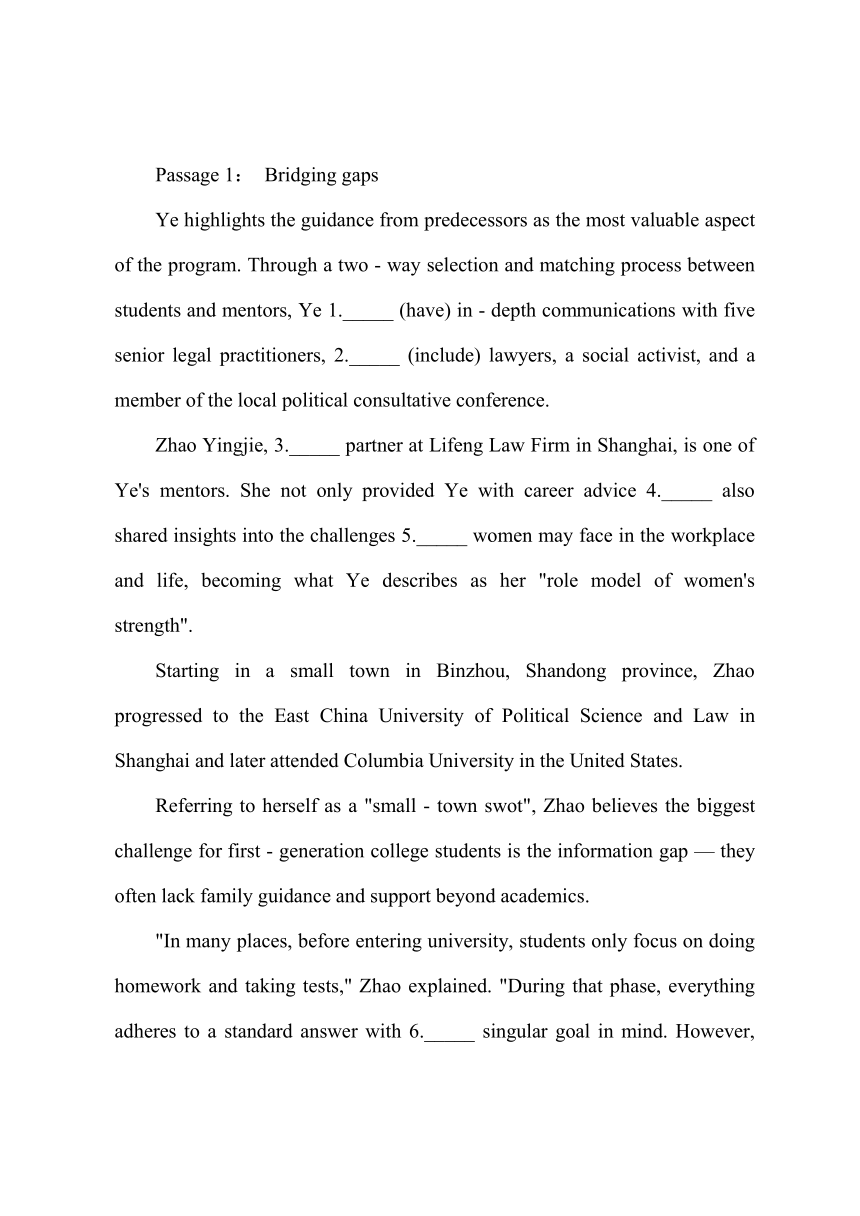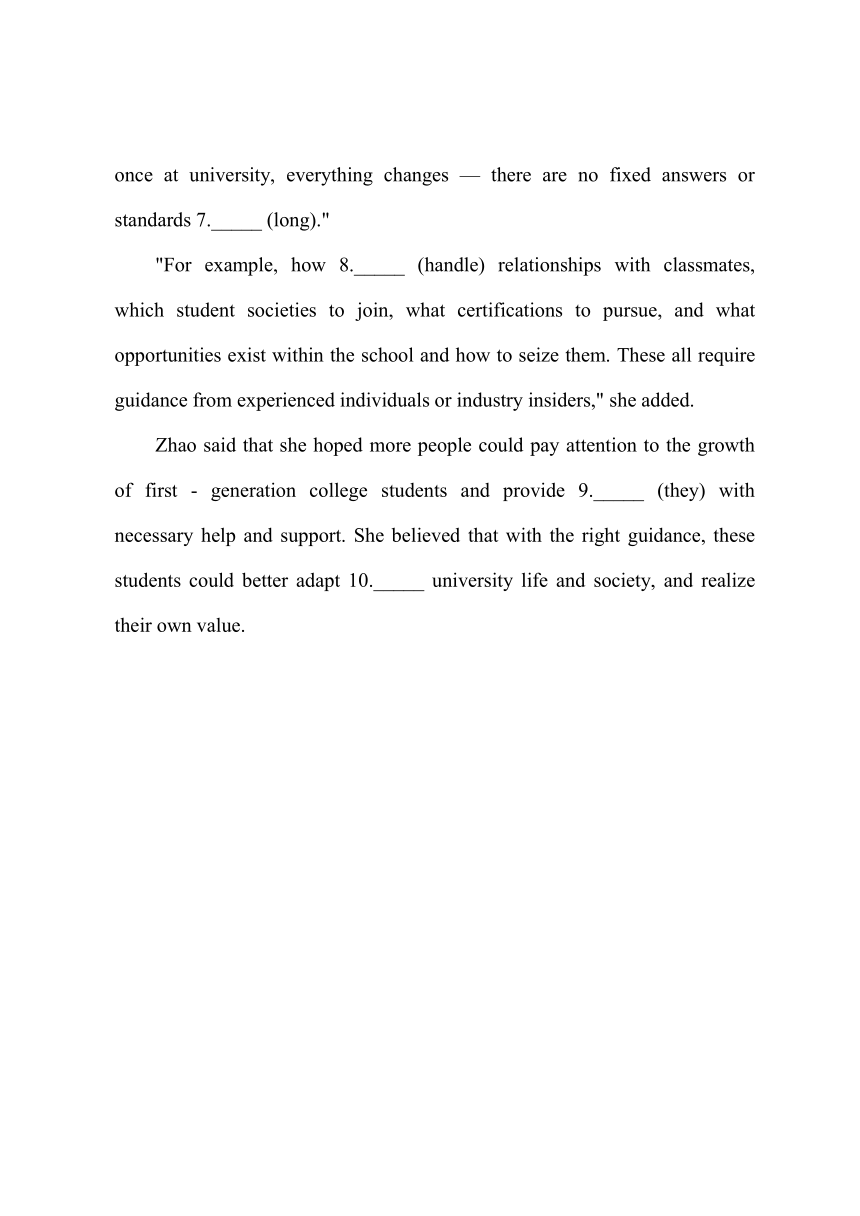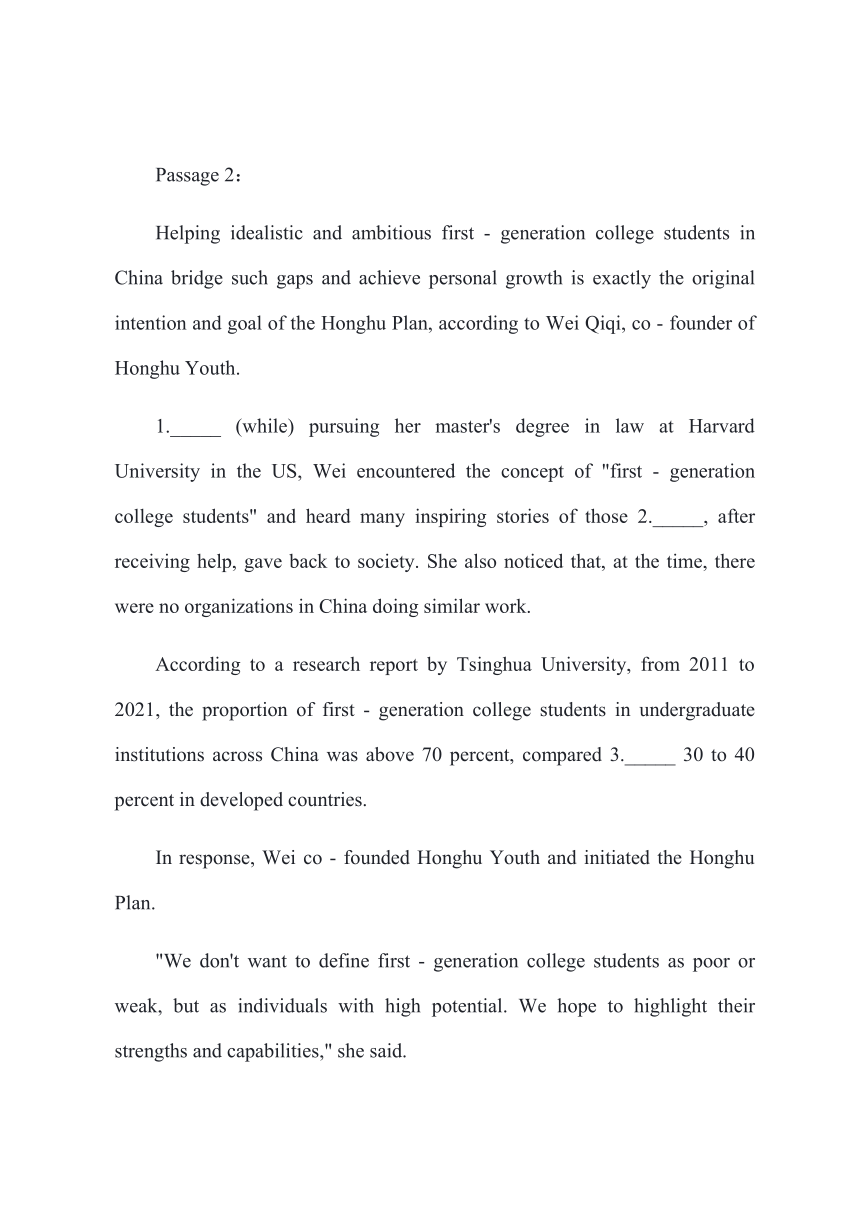China Daily 语法填空 平凡人追梦前行1(3篇,含答案)-2025届高三上学期英语二轮复习专项
文档属性
| 名称 | China Daily 语法填空 平凡人追梦前行1(3篇,含答案)-2025届高三上学期英语二轮复习专项 |  | |
| 格式 | docx | ||
| 文件大小 | 20.8KB | ||
| 资源类型 | 教案 | ||
| 版本资源 | 人教版(2019) | ||
| 科目 | 英语 | ||
| 更新时间 | 2025-01-09 10:49:58 | ||
图片预览




文档简介
Passage 1: Bridging gaps
Ye highlights the guidance from predecessors as the most valuable aspect of the program. Through a two - way selection and matching process between students and mentors, Ye 1._____ (have) in - depth communications with five senior legal practitioners, 2._____ (include) lawyers, a social activist, and a member of the local political consultative conference.
Zhao Yingjie, 3._____ partner at Lifeng Law Firm in Shanghai, is one of Ye's mentors. She not only provided Ye with career advice 4._____ also shared insights into the challenges 5._____ women may face in the workplace and life, becoming what Ye describes as her "role model of women's strength".
Starting in a small town in Binzhou, Shandong province, Zhao progressed to the East China University of Political Science and Law in Shanghai and later attended Columbia University in the United States.
Referring to herself as a "small - town swot", Zhao believes the biggest challenge for first - generation college students is the information gap — they often lack family guidance and support beyond academics.
"In many places, before entering university, students only focus on doing homework and taking tests," Zhao explained. "During that phase, everything adheres to a standard answer with 6._____ singular goal in mind. However, once at university, everything changes — there are no fixed answers or standards 7._____ (long)."
"For example, how 8._____ (handle) relationships with classmates, which student societies to join, what certifications to pursue, and what opportunities exist within the school and how to seize them. These all require guidance from experienced individuals or industry insiders," she added.
Zhao said that she hoped more people could pay attention to the growth of first - generation college students and provide 9._____ (they) with necessary help and support. She believed that with the right guidance, these students could better adapt 10._____ university life and society, and realize their own value.
答案
had
including
a
but
that
a
anymore
to handle
them
to
Passage 2:
Helping idealistic and ambitious first - generation college students in China bridge such gaps and achieve personal growth is exactly the original intention and goal of the Honghu Plan, according to Wei Qiqi, co - founder of Honghu Youth.
1._____ (while) pursuing her master's degree in law at Harvard University in the US, Wei encountered the concept of "first - generation college students" and heard many inspiring stories of those 2._____, after receiving help, gave back to society. She also noticed that, at the time, there were no organizations in China doing similar work.
According to a research report by Tsinghua University, from 2011 to 2021, the proportion of first - generation college students in undergraduate institutions across China was above 70 percent, compared 3._____ 30 to 40 percent in developed countries.
In response, Wei co - founded Honghu Youth and initiated the Honghu Plan.
"We don't want to define first - generation college students as poor or weak, but as individuals with high potential. We hope to highlight their strengths and capabilities," she said.
To date, the Honghu Plan 4._____ (success) completed four sessions, benefiting more than 400 students. Building on this foundation, the upgraded fifth session is currently underway, with 330 mentors and 223 students 5._____ (recruit), ensuring each student receives guidance from multiple mentors for 6._____ (comprehensive) support.
The plan aims to provide these students with 7._____ (variety) resources and platforms, 8._____ (help) them better adapt to college life and future careers. Wei believes that with the joint efforts of more people, first - generation college students can 9._____ (full) display their talents and contribute to society. And she hopes that this kind of support can be 10._____ long - term mechanism.
答案
While
who
to
has successfully
recruited
comprehensive
various
helping
fully
a
Passage 3
Born into an ordinary family in Wenzhou, Zhejiang province, Ye Jiayi, a 24-year-old girl, studied hard to enter university. She was eager to leave her hometown 1._____ a more promising career and a broader life, 2._____ she also wanted to contribute more to her family and society.
This is the story of millions of first-generation college students in China. As the first college student in her family, Ye knew she 3._____ (face) more difficulties in decision-making and personal growth than many of her peers. Due to a lack of understanding about university majors and the absence of mentors to guide her, she only realized after starting university that she did not like 4._____ chosen field. Fortunately, she later joined the master's program in law at Zhejiang University, 5._____ she had longed for.
However, after reaching a major crossroads in her career, she once again felt uncertain. But this time, a public welfare project provided her with the guidance she needed. China Youth of Tomorrow (Honghu Youth), a social enterprise focusing on educational equity, established 6._____ core talent development project, the Honghu Plan, in 2019. In Chinese culture, "honghu" is a large swan with lofty aspirations. The Honghu Plan specifically supports first-generation college students in China — those 7._____ immediate family members have not received higher education.
Ye Jiayi remembers the feelings of inferiority she had growing up. "The economic support my family could provide was limited, and I missed many learning opportunities, such as paid courses and forum activities," she said. "Thankfully, after becoming part of the Honghu Plan, I gained access to 8._____ wealth of resources." Since joining the program at the beginning of 2023, Ye 9._____ (benefit) from seven months of free, systematic guidance, including a series of courses, mentor interactions, and peer community activities. The courses covered fundamental skills like Office software and email 10._____ (write), along with job-related topics such as resume writing and career planning.
答案:
for
and
would face
the
which
its
whose
a
has benefited
writing
Ye highlights the guidance from predecessors as the most valuable aspect of the program. Through a two - way selection and matching process between students and mentors, Ye 1._____ (have) in - depth communications with five senior legal practitioners, 2._____ (include) lawyers, a social activist, and a member of the local political consultative conference.
Zhao Yingjie, 3._____ partner at Lifeng Law Firm in Shanghai, is one of Ye's mentors. She not only provided Ye with career advice 4._____ also shared insights into the challenges 5._____ women may face in the workplace and life, becoming what Ye describes as her "role model of women's strength".
Starting in a small town in Binzhou, Shandong province, Zhao progressed to the East China University of Political Science and Law in Shanghai and later attended Columbia University in the United States.
Referring to herself as a "small - town swot", Zhao believes the biggest challenge for first - generation college students is the information gap — they often lack family guidance and support beyond academics.
"In many places, before entering university, students only focus on doing homework and taking tests," Zhao explained. "During that phase, everything adheres to a standard answer with 6._____ singular goal in mind. However, once at university, everything changes — there are no fixed answers or standards 7._____ (long)."
"For example, how 8._____ (handle) relationships with classmates, which student societies to join, what certifications to pursue, and what opportunities exist within the school and how to seize them. These all require guidance from experienced individuals or industry insiders," she added.
Zhao said that she hoped more people could pay attention to the growth of first - generation college students and provide 9._____ (they) with necessary help and support. She believed that with the right guidance, these students could better adapt 10._____ university life and society, and realize their own value.
答案
had
including
a
but
that
a
anymore
to handle
them
to
Passage 2:
Helping idealistic and ambitious first - generation college students in China bridge such gaps and achieve personal growth is exactly the original intention and goal of the Honghu Plan, according to Wei Qiqi, co - founder of Honghu Youth.
1._____ (while) pursuing her master's degree in law at Harvard University in the US, Wei encountered the concept of "first - generation college students" and heard many inspiring stories of those 2._____, after receiving help, gave back to society. She also noticed that, at the time, there were no organizations in China doing similar work.
According to a research report by Tsinghua University, from 2011 to 2021, the proportion of first - generation college students in undergraduate institutions across China was above 70 percent, compared 3._____ 30 to 40 percent in developed countries.
In response, Wei co - founded Honghu Youth and initiated the Honghu Plan.
"We don't want to define first - generation college students as poor or weak, but as individuals with high potential. We hope to highlight their strengths and capabilities," she said.
To date, the Honghu Plan 4._____ (success) completed four sessions, benefiting more than 400 students. Building on this foundation, the upgraded fifth session is currently underway, with 330 mentors and 223 students 5._____ (recruit), ensuring each student receives guidance from multiple mentors for 6._____ (comprehensive) support.
The plan aims to provide these students with 7._____ (variety) resources and platforms, 8._____ (help) them better adapt to college life and future careers. Wei believes that with the joint efforts of more people, first - generation college students can 9._____ (full) display their talents and contribute to society. And she hopes that this kind of support can be 10._____ long - term mechanism.
答案
While
who
to
has successfully
recruited
comprehensive
various
helping
fully
a
Passage 3
Born into an ordinary family in Wenzhou, Zhejiang province, Ye Jiayi, a 24-year-old girl, studied hard to enter university. She was eager to leave her hometown 1._____ a more promising career and a broader life, 2._____ she also wanted to contribute more to her family and society.
This is the story of millions of first-generation college students in China. As the first college student in her family, Ye knew she 3._____ (face) more difficulties in decision-making and personal growth than many of her peers. Due to a lack of understanding about university majors and the absence of mentors to guide her, she only realized after starting university that she did not like 4._____ chosen field. Fortunately, she later joined the master's program in law at Zhejiang University, 5._____ she had longed for.
However, after reaching a major crossroads in her career, she once again felt uncertain. But this time, a public welfare project provided her with the guidance she needed. China Youth of Tomorrow (Honghu Youth), a social enterprise focusing on educational equity, established 6._____ core talent development project, the Honghu Plan, in 2019. In Chinese culture, "honghu" is a large swan with lofty aspirations. The Honghu Plan specifically supports first-generation college students in China — those 7._____ immediate family members have not received higher education.
Ye Jiayi remembers the feelings of inferiority she had growing up. "The economic support my family could provide was limited, and I missed many learning opportunities, such as paid courses and forum activities," she said. "Thankfully, after becoming part of the Honghu Plan, I gained access to 8._____ wealth of resources." Since joining the program at the beginning of 2023, Ye 9._____ (benefit) from seven months of free, systematic guidance, including a series of courses, mentor interactions, and peer community activities. The courses covered fundamental skills like Office software and email 10._____ (write), along with job-related topics such as resume writing and career planning.
答案:
for
and
would face
the
which
its
whose
a
has benefited
writing
